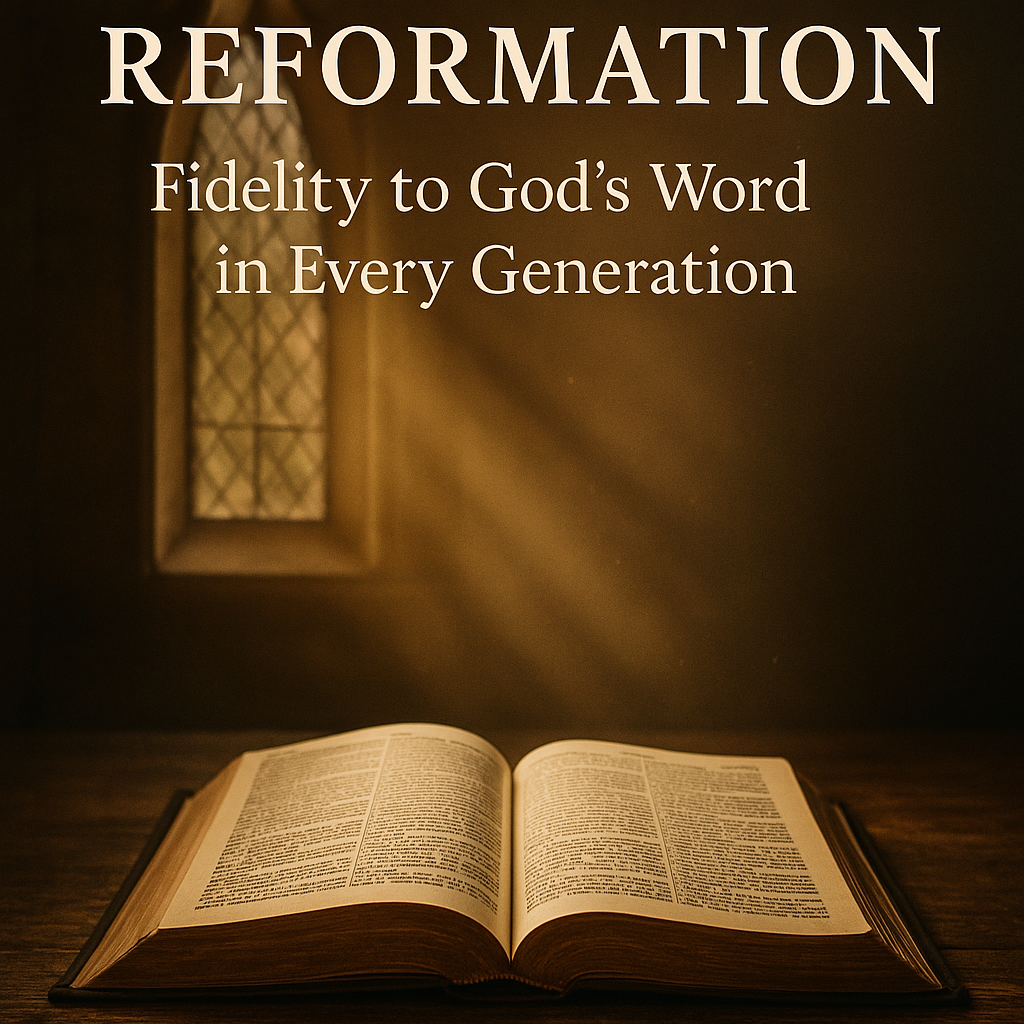⏱️ Estimated Reading Time: 5 min read
The Protestant Reformation: Fidelity to God’s Word in Every Generation
By Dave Jenkins
What Is the Protestant Reformation?
The Protestant Reformation was a sixteenth-century recovery of biblical authority led by faithful pastor-theologians such as Martin Luther, Ulrich Zwingli, and John Calvin. Their concern was profoundly pastoral: that Christ’s Church be grounded in the Word of God and the sufficiency of the finished work of the Lord Jesus. Luther’s confrontation of indulgences grew from a burden for souls and a conscience bound to Scripture, whatever the cost.
Yet Luther stood on the shoulders of earlier witnesses who labored for reform: Peter Waldo (c. 1140–c. 1205) and the Waldensians in the Alpine regions, John Wycliffe (c. 1328–1384) and the Lollards in England, and Jan (John) Hus (c. 1372–1415) in Bohemia. God, in every age, raises voices to call His people back to His Word.
Key Figures of the Reformation
Martin Luther
On October 31, 1517, Luther posted his Ninety-Five Theses at Wittenberg, igniting a debate that led to his excommunication and, ultimately, to the Diet of Worms (1521). There he declared he would not recant unless persuaded “by the testimony of the Scriptures or by clear reason.” Luther’s study of the Bible led him to proclaim justification by faith alone in Christ alone, to translate Scripture into German for the people, and to recover the dignity of every lawful vocation under the doctrine of the priesthood of all believers.
Other Reformers and Allies
The Reformation spread across Europe: Zwingli in Zurich, Calvin in Geneva, and many others who preached, taught, wrote, and suffered for the truth:
- Hugh Latimer (1487–1555)
- Martin Bucer (1491–1551)
- William Tyndale (1494–1536)
- Philip Melanchthon (1497–1560)
- John Rogers (c. 1500–1555)
- Heinrich Bullinger (1504–1575)
In 1543, Martin Bucer urged John Calvin to defend Protestant convictions before Emperor Charles V. Calvin’s The Necessity of Reforming the Church (1544) remains one of the clearest presentations of Reformed Protestantism ever written.
Providence and the Printing Press
God’s providence also supplied a technological catalyst: Johannes Gutenberg’s mid-fifteenth-century movable-type printing press accelerated the spread of biblical preaching, catechisms, translations, and confessions, placing the Scriptures and sound doctrine into the hands of the people.
The Purpose of the Protestant Reformation
At the heart of the Reformation was not innovation but restoration—returning the Church to the authority of God’s written Word. The central crisis concerned which authority governs Christ’s Church: Scripture, or Scripture plus church tradition and magisterial pronouncements. The Reformers answered with the cry of Sola Scriptura—that the Bible alone is the final, sufficient, clear, and binding authority for faith and life.
If you want to hear God speak, read the Scriptures. If you want to hear Him aloud, read them out loud.
The Five Solas:
- Sola Scriptura — Scripture alone
- Solus Christus — Christ alone
- Sola Gratia — Grace alone
- Sola Fide — Faith alone
- Soli Deo Gloria — The glory of God alone
A return to Scripture naturally recovered the doctrines of grace, directing all glory to God in salvation. With Scripture as the plumb line, the Reformers gratefully learned from the Church Fathers yet refused to place any human authority above God’s Word.
The Results of the Reformation
Because the Church is composed of redeemed sinners—“at the same time righteous and sinful,” as Luther said—it is always in need of correction by Scripture. The Latin motto Ecclesia semper reformanda est (“the Church is always to be reforming”) captures this posture of humble, continual submission to the Lord’s Word.
The Word of God stands over the people of God. We must not only preach the Word, but also hear it and obey it. As Romans 10:17 teaches, “Faith comes from hearing, and hearing through the word of Christ.”
Dr. Michael Horton writes, “Personally, and corporately, the church comes into being and is kept alive by hearing the gospel. The church is always on the receiving end of God’s good gifts and His correction. The Spirit does not lead us apart from the Word but directs us back to Christ as He is revealed in Scripture. We always need to return to the voice of our Shepherd. The same gospel that creates the church sustains and renews it.”[1]
When we invoke the full phrase—“the church Reformed and always being reformed according to the Word of God”—we confess that we belong to the Church and not merely to ourselves, and that Christ continually renews His Church by His Word, not by the spirit of the age.[2]
Reformation begins personally, as God’s people return daily to Scripture in repentance, faith, and obedience—and it bears fruit corporately as churches submit all doctrine and practice to the Word of God.
Four Things Christians Should Know about the Protestant Reformation
- A Renewal Movement: The Reformation sought to reform the Church according to the Word of God.
- Scripture and Gospel Centrality: It restored Scripture’s primacy and the gospel’s central place in the life of the local church.
- The Spirit’s Work: The Reformation recovered rich, biblical teaching on the Holy Spirit’s person and work—Calvin is often called the “theologian of the Holy Spirit.”
- Christ Magnified: It makes much of Christ and little of man—exalting the person and work of Jesus while cultivating humility in His people.
Conclusion
The Five Solas are not optional add-ons; they give the Church her evangelical heart and biblical backbone. Each year on Reformation Day (October 31), we remember how the Lord used ordinary pastors and laypeople to call His Church back to Scripture. May their example strengthen us to hold fast to God’s Word, proclaim His gospel with conviction and compassion, and labor for the glory of Christ in every generation.
Soli Deo Gloria.
For more from our Reformation series please visit: Always Reforming: Fidelity to God’s Word in Every Generation
References
- Michael Horton, “Semper Reformanda,” Tabletalk, October 1, 2009. Accessed October 18, 2025. https://www.ligonier.org/learn/articles/semper-reformanda/
- Ibid.
Dave Jenkins is happily married to his wife, Sarah. He is a writer, editor, and speaker living in beautiful Southern Oregon. Dave is a lover of Christ, His people, the Church, and sound theology. He serves as the Executive Director of Servants of Grace Ministries, the Executive Editor of Theology for Life Magazine, the Host and Producer of Equipping You in Grace Podcast, and is a contributor to and producer of Contending for the Word. He is the author of The Word Explored: The Problem of Biblical Illiteracy and What To Do About It (House to House, 2021), The Word Matters: Defending Biblical Authority Against the Spirit of the Age (G3 Press, 2022), and Contentment: The Journey of a Lifetime (Theology for Life, 2024). You can find him on Facebook, Twitter, Instagram, Youtube, or read his newsletter. Dave loves to spend time with his wife, going to movies, eating at a nice restaurant, or going out for a round of golf with a good friend. He is also a voracious reader, in particular of Reformed theology, and the Puritans. You will often find him when he’s not busy with ministry reading a pile of the latest books from a wide variety of Christian publishers. Dave received his M.A.R. and M.Div through Liberty Baptist Theological Seminary.




